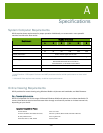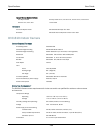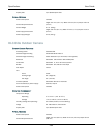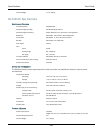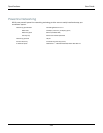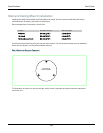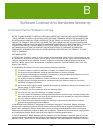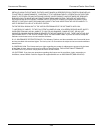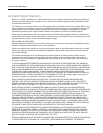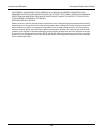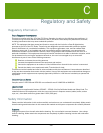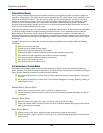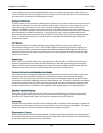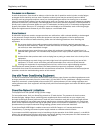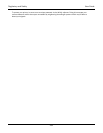
Regulatory and Safety User Guide
149
If, after falling, the camera exhibits degraded performance, has ceased operating, shows visible cracks or if
there is evidence that internal components have come loose, disconnect the camera from its cable and follow
the instructions in this manual for obtaining service repair.
EXPOSURE TO MOISTURE
The WiLife Indoor and Spy cameras are designed to be used only in dry, indoor environments. Do not use them
near water; for example, near a bath tub, washbowl, kitchen sink, or laundry tub, in a wet basement, or in or
near a swimming pool. Exposure to rain, mists, excessive humidity and liquid emersion will likely cause
significant degradation in system performance and utility. If any WiLife component has been exposed to
moisture, immediately unplug all components from power outlets and allow the components to dry completely
before attempting to reinstall the equipment. If, after drying, the system exhibits degraded performance,
disconnect the system from all power sources and follow the instructions in this manual for obtaining service
repair. The WiLife Outdoor Camera, on the other hand, is weatherproof and protected against water and
temperature extremes.
FIRE HAZARDS
Care should be taken to keep WiLife equipment and packing material away from open flames and
temperatures in excess of 34°C (93°F). Care should be taken to keep electrically conductive objects from
falling between the WiLife camera power supply and the WiLife HomePlug®/USB Bridge and the wall plug,
potentially shorting out the AC power and causing a fire. If the case of any WiLife equipment becomes open,
cracked or broken in any way disconnect the power source to the component and refer to the service repair
section of this manual.
SHARP EDGES
Under normal circumstances WiLife system components are safe to handle. If the WiLife components are
exposed to significant physical shocks, the WiLife enclosures could break open exposing sharp enclosure
edges and sharp internal component edges. In the event of enclosure breakage, carefully remove affected
components from their power source and follow the service procedures of this manual.
CHOKING, SUFFOCATION AND STRANGULATION HAZARDS
Care should be taken to keep WiLife equipment and packing material away from small children and persons
with diminished mental capability. Specifically, the camera lens might be unscrewed and accidentally
swallowed. The wall/ceiling mount screws and anchors could be accidentally swallowed. The WiLife cables
could also be accidentally swallowed or become wrapped about a neck. If the WiLife components are exposed
to significant physical shocks, the WiLife enclosures could break open and small internal components could
come loose and become a choking risk. Plastic packing material may present a suffocation hazard to small
children and persons with diminished mental capability. Please properly dispose of all packing material.
USE WITH THIRD PARTY DEVICES
Do not plug the WiLife cables into any device other than the intended WiLife components. Doing so could
damage the equipment and expose the user to fire and electrical shock hazards. The WiLife equipment is
specifically NOT compliant with “power over Ethernet” standards such as IEEE 802.3af.
VENTILATION
Keep the area around WiLife components free of materials that may obstruct airflow and proper ventilation of
the components. This system should never be placed near or over a hot radiator or heat register. This system
should not be placed in a built-in installation unless proper ventilation is provided.
ENVIRONMENTAL HAZARDS
Please properly dispose of WiLife packing materials. Cardboard, paperboard and plastic packing material can
be recycled. Please consult your local recycling center for details. Burning this material is not recommended as
it may release harmful chemicals into the environment.



